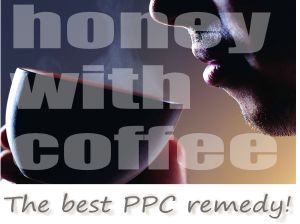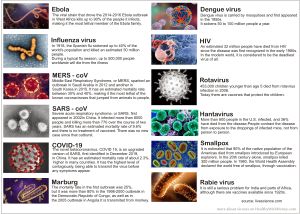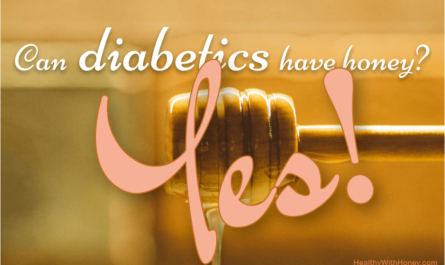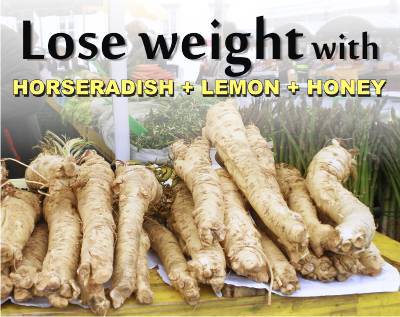What is “Persistent post-infectious cough”?
Also known as PPC, it is the most annoying cough that remains after a common cold or an upper respiratory tract infection, for more than three weeks.
This cough is expected to last for only one or two weeks, but persists for more than 3 weeks and up to many months.
PPC is reported to 11–25% of all cases of chronic cough.
What are the symptoms? Persistent tickling or irritating sensation in the throat which leads to paroxysms of coughing.
PPC is stimulated by cigarette smoke, chemical fumes, aerosol sprays, dust, perfumes, drinking, eating, talking, laughing, and breathing cold air.
How is it treated?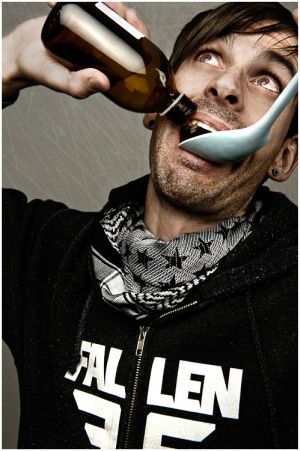
Usually it is treated with powerful drugs, many of them having serious side effects, including codeine and dextromethorphan (known as centrally acting antitussives), antihistamines, narcotics, and bronchodilators.
But not the fact that we have to take them is the problem. It is not that difficult to buy some and swallow them. The problem is that THEY DON’T WORK! We keep trying them, one at a time, continuing to cough and cough, day and night.
Of course there are always the folk remedies, our eldests know them better, raging from onion broth to the star of the study in discussion here, honey and coffee.
The scientists heard about this old folk remedy coffee and honey, and decided to reveal the truth.
From 2008 to 2011, at the Baqiyatallah University Hospital, Tehran, Iran, a team of researchers conducted a study on 97 adults, having PPC for more than 3 weeks.
- The first group received a jam-like paste consisting of 500 g of honey and 70 g of original instant coffee (honey coffee, HC). This means that each person took 20.8 g of honey and 2.9 g of coffee three times daily.
- The second group received 320 mg prednisolone (steroid, S) Each person took 13.3mg of prednisolone, three times daily.
- The third group received guaifenesin (placebo/control, C). Each person took 5g of guaifenesin, three times daily.
The participants were told to dissolve a specified amount of their product in warm water and to drink the solution every eight hours, for one week.
All the participants were evaluated before treatment and one week after completion of treatment to measure the severity of their cough. They measured the cough frequency before and after one week’s treatment calculated by a validated visual analogue cough questionnaire score. Here is the result:
The researchers team said: “Analysis of variance showed a significant difference between the mean cough frequency before and after treatment in the HC group versus the S group (p< 0.001). Honey plus coffee was found to be the most effective treatment modality for PPC. ” The treatment is safe and effective.
 Take honey and coffee!
Take honey and coffee!
Why honey?
Because honey is a well-known medicine. Known since 3000 BC, mentioned in the Bible and other holy books. Mentioned as a curative for human illnesses in the Quran, 1400 years ago. Nowadays honey is used especially for respiratory problems. Even the World Health Organization recognized honey as “potential treatment for cough and other URTI symptoms”.
The composition of honey is yet not completely discovered. Among the 200 substances we managed to discover thus far: sugars (fructose, glucose, maltose and sucrose), minerals, proteins, some vitamins, organic acids, and antioxidants (phenolic compounds, flavonoids, enzymes, carotenoid-like substances, amino acids, and other phytochemicals).
Honey stimulates epithelialisation stages, tissue regeneration, and improvement of granulation and debridement which, in turn, accelerates tissue repair and leads to wound healing. The best honey for skin damages remains manuka honey.
· Manuka honey – THE BEST to treat wounds, burns, skin infections.
· Revamil medical grade honey. Comparison to manuka honey.
or see all article written on medical grade honey.
Personally I tried to understand their explanations on how honey manages to heal us, but got stuck in the language. They are saying: “Honey lowers plasma prostaglandin concentrations by reducing prostaglandin synthesis at the site of application. It also increases nitric oxide (NO) levels in the lesions and has antioxidant and anti-inflammatory activities. It seems to be that, due to their hyperosmolarity…..”
If you understand this, please read here the entire article. All I know is that they explained it after the true reality was proved. In the end, all we need to know is that it works!
Why coffee?
Caffeine is a naturally occurring alkaloid found in coffee, and also in tea, cola drinks, and cocoa. It is a methylxanthine (like theophylline) meaning a bronchodilator believed to stimulate breathing. Also used to prevent apnoea. Caffeine is also hypoalgesic with anti-inflammatory effects. It is the world’s most commonly consumed psychoactive substance, which stimulates the central nervous system. It improves vigilance and psychomotor performance and increases levels of self-reported alertness and, :), decreases levels of self-reported fatigue and sleepiness. (from PrimaryCare Respiratory Journal)
Conclusion:
If you had a cold and got stuck with an annoying cough, for more than 3 weeks, try what you already like a lot: coffee.
Take 1 tablespoon of honey (21 g) mixed with half a teaspoon (3 g) of instant coffee, in a glass (200 ml) of warm water, 3 times a day, for at least 1 week.
Considering the amount of coffee, it is recommended only for adults. DON’T GIVE IT TO CHILDREN! There are different remedies for them.
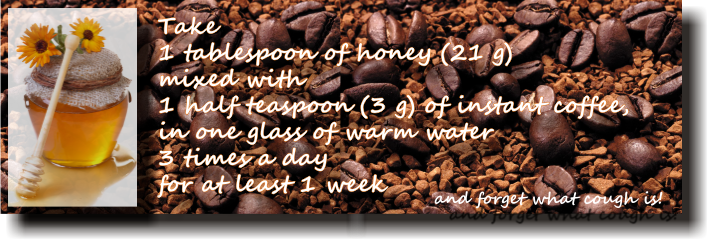
*********
References:
http://www.thepcrj.org/journ/view_article.php?article_id=1064
http://www.greenmedinfo.com/
Picture credit: “man taking syrup” picture credit me_on_flickr via flickr.com
“coffee beans” picture credit: free-picture.net,
man drinking coffee” picture credit: free-picture.net,
“jar of honey” picture credit: ddsign_stock via http://www.bigstockphoto.com/

